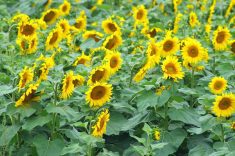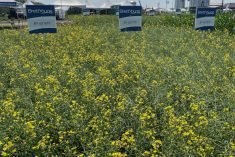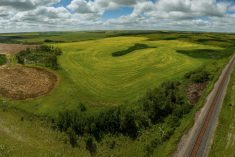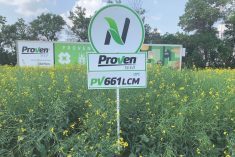With the cost of hybrid canola seed being the No. 1 expense in producing the oilseed crop, Prairie farmers can have confidence knowing each of the 4.25 million canola seeds in a 50-pound bag was produced with care and attention to quality control.
That’s the commitment of long-time hybrid seed producers, HyTech Production Ltd., based at Lethbridge in southern Alberta, as over the past 26 years the company has refined a system to produce much of the hybrid seed used by Prairie farmers to grow more than 25 million acres of canola and other crop types each year.
HyTech is a contract seed grower or “toller” that works with virtually all seed companies in Canada and Australia, in one capacity or another, specializing in production of up to 10,000 tonnes of hybrid canola, hybrid rye, hybrid hemp and hybrid mustard seed annually.
Read Also
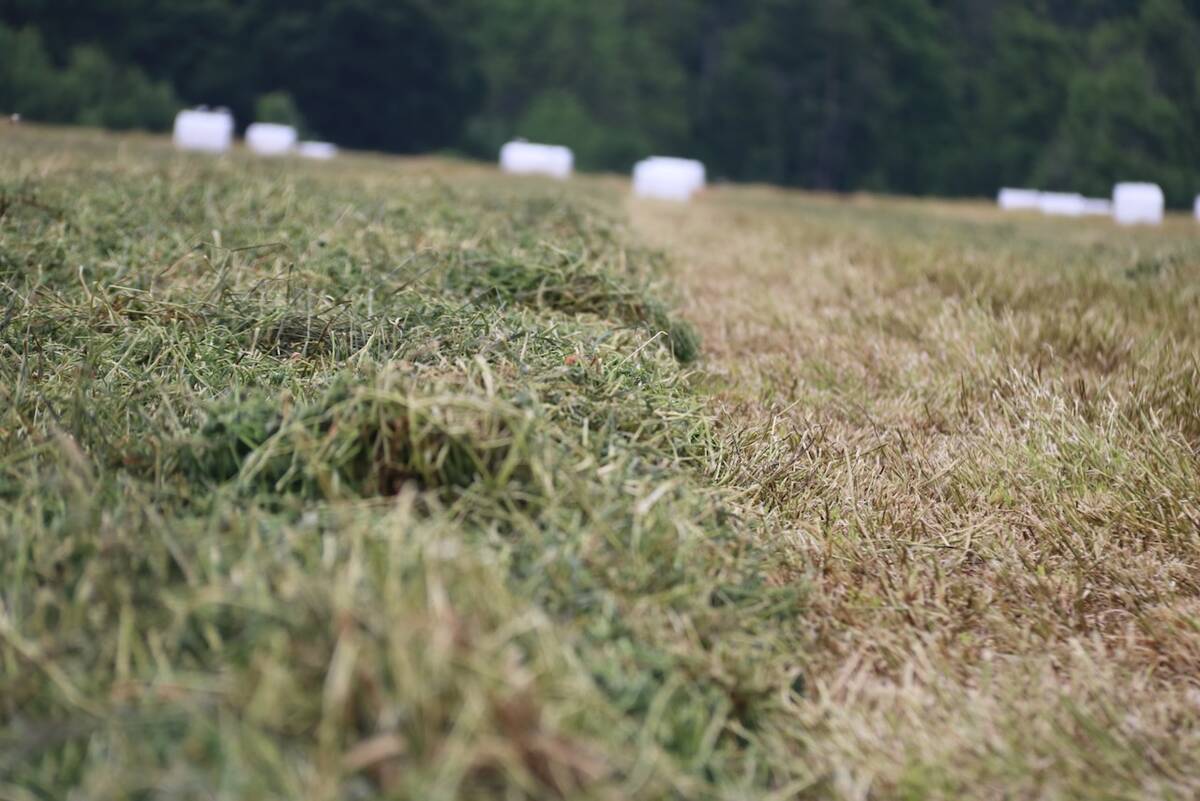
New high-performance forage training program to launch in 2026
A new Canadian Forage and Grasslands Asssociation high-performance forage program will be a resource for farmers, agronomists and others in the forage sector.
HyTech isn’t involved in the actual breeding work, but once plant breeders do have parent material available, HyTech is often contracted to bring those new varieties through different stages leading to commercial production.
“Most of our work is involved in the production of hybrid seed that eventually gets delivered to farms,” says Scott Horner, chief commercial officer.
That said, Horner who was the second hire made by company founder Brian McNaughton about 24 years ago – adds that, depending on the seed company, “we also often work with plant breeders to produce seed for the parent lines as well.”
The hybrid seed that goes out to farmers can be produced in a couple of different ways. Some seed companies will produce their own; others will hire a contract producer such as HyTech; still others do a bit of both.
Hemisphere to hemisphere
Tollers have been used to produce seed since hybrid seed production technology was developed.
“Brian McNaughton, who has been around the seed industry his whole life, saw in Europe and other parts of the world that as hybrid crops were developed, the seed companies began using contract growers to produce the seed,” Horner says.
“So in the late 1990s, as seed companies were introducing hybrid canola varieties in Western Canada, he created HyTech to offer those production services here.”
HyTech started out producing hybrid canola seed, and in later years has expanded to include production of hybrid seed for rye, hemp and mustard seed companies. And in 2022 it took business a step further, building a high-capacity plant north of Lethbridge, providing seed treating and packaging services to their customers as well.

HyTech has contracts with dozens of commercial farmers in southern Alberta, Montana and Washington state to produce hybrid canola seed during the Northern Hemisphere growing season. Then, in the winter, it works with commercial farmers in the Southern Hemisphere to produce a second crop of hybrid seed in Chile.
Producing hybrid seed in Chile is partly about timing as well as risk management, Horner says.
“As plant breeders for different companies are introducing new varieties, the first seed of that new variety is being harvested in the fall,” he says. “The company wants to ramp up production so they can get seed out to farmers as quickly as possible, so we can take those new lines to Chile that winter and begin production there.
“Also, if there have been any production-related problems with seed during the growing season in Canada, we can make up any shortages by growing it in Chile.”
Back in Western Canada and the northwestern U.S., HyTech has developed a trusted network of commercial farmers to produce hybrid seed. All hybrid seed crops are produced under irrigation to reduce risk and optimize yield.
With canola production, for example, each contract grower must assure a required specification for isolation. That means the farm itself can’t be growing any other type of canola and there can’t be any other canola production on neighbouring farms within 800 metres or half a mile of the field producing hybrid canola seed.

Most of the contract growers use their own field-scale equipment, such as precision planters to seed the hybrid crop, in alternating strips or bays of male canola plants along with bays of female canola plants in the field.
Once those male and female crop lines are up and growing, then pollinating contractors bring in hives with honeybees and hutches with leafcutter bees to optimize the spread of male plant pollen to the female plants.
Both types of bees are important, Horner says. They both do the same job, although honeybees are a bit more robust for travelling under windy conditions, whereas leaf cutter bees are more active as temperatures rise on hotter days, when honeybees are inclined to stay home to help cool the hive. So the two types of bees serve as a risk management strategy for crop pollination.
Once plants have flowered and pollination is complete, the bays of male canola plants are sprayed out with a herbicide. The contract growers will harvest the female hybrid canola seed in the fall for delivery to HyTech’s processing plant north of Coaldale.
While hybrid seed crops are produced in Alberta, Montana and Washington state, a further degree of isolation is needed when producing parent material. All production of seeds for hybrid parent material is done in British Columbia — specifically, the Kootenay region in the southeast, as well as the Okanagan — two areas where no canola is grown.
“It is important to keep the parent lines pure, so the lines are grown in areas where there is no canola production at all,” says Horner. Because HyTech is usually working with ranchers rather than farmers, the company just rents the land and does all its own farming to produce the parent seed crops.
Once all crops are harvested, the seed is cleaned by three contract cleaning plants: K3 Seeds at Picture Butte and Mared Seeds at Lomond, both in Alberta, and Nadeau Seeds in Manitoba. It’s all then trucked back to the HyTech plant in Alberta for seed treatment and bagging.
‘Attention to detail’
Production and handling of hybrid seed is not a job for the disorganized. HyTech deals with multiple seed companies, producing multiple varieties, and at every step of the operation those varieties need to be kept identified and separate. At the processing plant, each variety is treated with a seed treatment formula specified by each company. Equipment has been designed so it can be easily yet thoroughly cleaned between each batch of seed. After seed treatment, most varieties are bagged in mini-bulk storage bags, although some seed companies want cleaned seed sorted and packaged and labelled in 22.7-kg bags. Seed companies arrange to pick up their seed batches from HyTech and handle their own distribution.

“There are a lot of logistics involved, so let’s just say we take attention to detail to the next level,” says Horner.
While HyTech has established a solid network of contract producers, Horner says they are interested in hearing from other irrigation farmers who can provide a four-year rotation between canola crops, along with that 800-metre isolation distance.
While canola hybrid varieties are well established, Horner says he expects developers of other crop types to be producing more hybrid varieties as well. They are working with Agriculture and Agri-Food Canada breeders as well as a Saskatoon-based grower organization, Mustard 21, producing new hybrid mustard seed varieties: AAC Brown 18, AAC Brown Elite and a composite variety, AAC Yellow 80.
They also work with KWS Cereals, a European company, to produce seed for hybrid rye varieties, which appear to do well in Western Canada. A fairly new Saskatoon company, Verve Seeds, is also developing hybrid varieties of industrial hemp seed. And Horner notes work has been ongoing for 10 years or more to develop hybrid wheat varieties.
“We have a solid track record in producing hybrid seed and we are always interested in working with new companies and new crops,” Horner says. “And certainly our grower base is keen to try new crops as well. It is sort of that pioneer spirit to try something new that is part of our company values. Hopefully we can be part of the process in bringing improved high-yielding crops to western Canadian farmers.”





